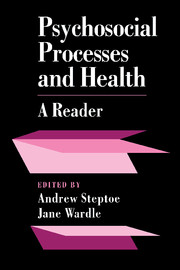Book contents
- Frontmatter
- Contents
- Preface
- Section 1 Life stress, social support and health
- Section 2 Psychophysiological processes in disease
- Section 3 Personality, behaviour patterns and health
- Section 4 Health practices and the modification of health risk behaviour
- Section 5 Coping with illness and disability
- Section 6 Behavioural interventions in medicine
- Index
Section 2 - Psychophysiological processes in disease
Published online by Cambridge University Press: 05 August 2016
- Frontmatter
- Contents
- Preface
- Section 1 Life stress, social support and health
- Section 2 Psychophysiological processes in disease
- Section 3 Personality, behaviour patterns and health
- Section 4 Health practices and the modification of health risk behaviour
- Section 5 Coping with illness and disability
- Section 6 Behavioural interventions in medicine
- Index
Summary
Readings
Pain mechanisms: a new theory. R. Melzack and P. D. Wall. Science, 150, 971-9,1965.
Effects of coping behavior on gastric lesions in rats as a function of the complexity of coping tasks. A. Tsuda, M. Tanaka, T. Nishikawa and H. Hirai. Physiology and Behavior, 30, 805-8, 1983.
Social stress and atherosclerosis in normocholesterolemic monkeys. J. R. Kaplan, S. B. Manuck, T. B. Clarkson, F. M. Lusso, D. M. Taub and E. W. Miller. Science, 220, 733-5, 1983.
Mental stress and the induction of silent myocardial ischemia in patients with coronary artery disease. A. Rozanski, C. N. Bairey, D. S. Krantz, J. Friedman, K. J. Resser, M. Morell, S. Hilton-Chalfen, L. Hestrin, J. Bietendorf and D. S. Berman. New England Journal of Medicine, 318,1005-12, 1988.
Depressed lymphocyte function after bereavement. R. W. Bartrop, E. Luckhurst, L. Lazarus, L. G. Kiloh and R. Penny. Lancet, i, 834-6, 1977.
Psychological stress and susceptibility to the common cold. S. Cohen, D. A. J. Tyrrell and A. P. Smith. New England Journal of Medicine, 325, 606-12, 1991.
Introduction
Section 1 documented some of the empirically verified links between life stress, support and health. The question that arises is what are the processes through which factors in the psychosocial environment influence disease aetiology? Unless descriptive studies of clinical phenomena are coupled with a knowledge of mechanism, the study of psychosocial factors will remain outside the mainstream of biobehavioural research and understanding. The readings in Section 2 describe the psychophysiological processes linking behavioural stressors and emotional distress with disease aetiology. The papers highlight the importance of psychophysiological processes in several clinical conditions, including pain, gastrointestinal lesions, cardiovascular pathology and resistance to infection. These readings have been selected to illustrate the diverse research strategies that have proved valuable, and include the analysis of clinical phenomena (Melzack and Wall), acute and chronic stress studies with animals (Tsuda et al.; Kaplan et al.), short-term experiments with humans (Rozanski et al.) and the experience of life stress (Bartrop et al.; Cohen et al.).
The psychophysiological processes relevant to the aetiology and course of disease are complex. It is well established that noxious stimuli and challenging conditions may elicit a broad range of autonomic, neuroendocrine and immunological adjustments.
- Type
- Chapter
- Information
- Psychosocial Processes and HealthA Reader, pp. 99 - 111Publisher: Cambridge University PressPrint publication year: 1994

